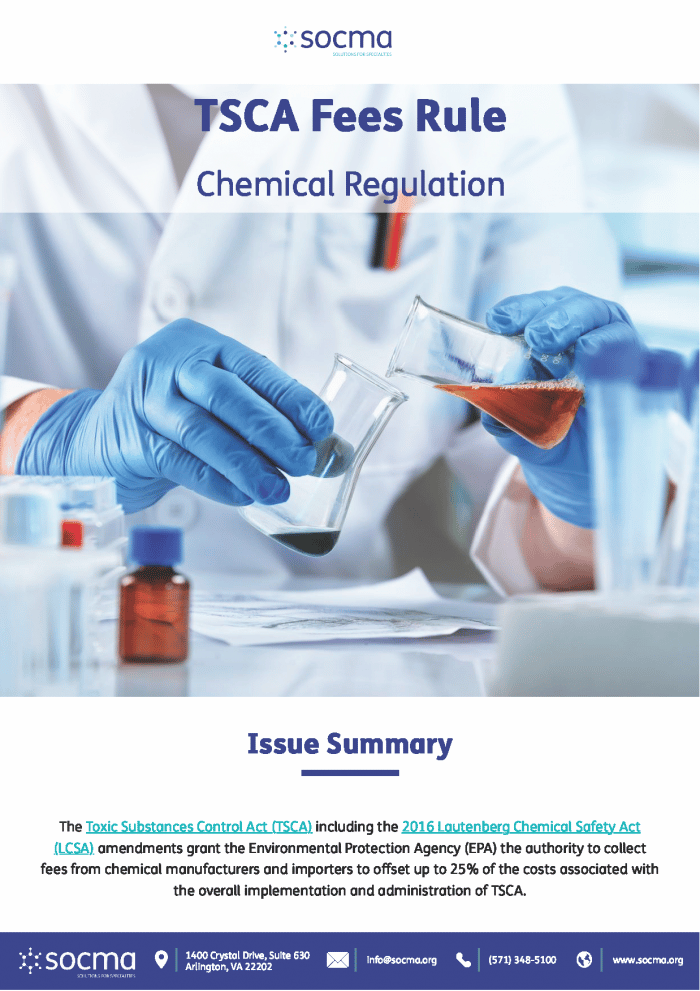Chemical Regulation
TSCA Fees Rule
SOCMA Issue Summary:

The Toxic Substances Control Act (TSCA) including the 2016 Lautenberg Chemical Safety Act (LCSA) amendments grant the Environmental Protection Agency (EPA) the authority to collect fees from chemical manufacturers and importers to offset up to 25% of the costs associated with the overall implementation and administration of TSCA.
Impact on the Specialty Chemical Industry:
Increased fees for New Chemical approvals cost SOCMA member companies more money to innovate new chemicals. Innovation is the lifeblood of the industry, and higher costs create additional barriers to market entry, inhibit research and development efforts, and create hurdles to bringing new products to market.
| Fee category | Current Fees | Final Fees |
| Test order | $11,650 | $25,000 (Small Business – $5,000) |
| Test rule | $35,080 | $50,000 (Small Business – $10,000) |
| Enforceable consent agreement | $27,110 | $50,000 (Small Business – $10,000) |
| PMN and consolidated PMN, SNUN, MCAN and consolidated MCAN | $19,020 (Small Business – $3,330) | $37,000 (Small Business – $6,480) |
| LoREX, LVE, TME, Tier II exemption, TERA, Film Articles | $5,590 (Small Business – $1,120) | $10,870 (Small Business – $2,180) |
| EPA-initiated risk evaluation | Two payments resulting in $2,560,000 | Two payments resulting in $4,287,000 (Small Business – $857,400) |
| Manufacturer-requested risk evaluation on a chemical included in the TSCA Work Plan | Two payments of $945,000, with final invoice to recover 50% of actual costs. | Two payments of $1,414,924, with final invoice to recover 50% of actual costs. |
| Manufacturer-requested risk evaluation on a chemical not included in the TSCA Work Plan | Two payments of $1.89M, with final invoice to recover 100% of actual costs. | Two payments of $2,829,847, with final invoice to recover 100% of actual costs. |
SOCMA’s Goal:
SOCMA seeks to minimize cost burdens on its members with specific targeted reductions in the fees for the Section 5 new chemical submissions.
More on TSCA:
- Innovation is a driving force in the specialty chemical industry, and new chemicals are vital to improvement of products in downstream manufacturing. Large increases in fees dissuade the submission of premanufacture notices (PMNs) and low-volume exemptions (LVEs), which can affect innovation in the wider economy.
- A substantial increase in fees is unjustified at a time when EPA routinely misses the statutory deadlines for approval of PMNs and LVEs. There must be accountability and improved performance by EPA related to the collection of fees.
- Many specialties chemical companies meet the Small Business Administration standard of a small business. Small businesses cannot easily absorb a sharp increase in fees.
- Higher fees also function as a barrier to entry for potential new market participants. Startups may not be able to pay high fees, especially combined with an inconsistent review process that regularly misses statutory review deadlines and prevents companies from properly planning and forecasting bring a new product to market
- Additional fees have a ripple effect on the economy, as an increase in the cost of bringing new chemicals to market may be passed on to downstream customers, ultimately leading to higher prices for consumers.
- Large increases in fees encourage manufacturers to move production overseas, leading to the loss of U.S. jobs.
- EPA’s own estimates of PMN and LVE submissions have declined as fees have increased fees:
| PMNs, SNUNs & MCANs | Exemption Requests | |
| Actual submissions, 2016. | 577 | 560 |
| Initial fees proposed rule estimate, 2018. | 462 | 560 |
| First triennial review proposal estimate, 2021. | 301 | 320 |
| Current proposal estimate. | 210 | 290 |
Current Status:
EPA finalized the updated “Fees for the Administration of the Toxic Substances Control Act (TSCA)” Rule on February 5, increasing the fees associated with the administration of the TSCA program. This includes fees associated with new chemical reviews and administering test orders, among other things. This rule does have discounted rates for small businesses.
SOCMA Activity:
- Summer 2022: Formed a member task force to spearhead SOCMA advocacy efforts.
- September 2022: SOCMA and member companies met with the White House Office of Management and Budget to explain the negative impact of increased fees on innovation and growth of both the chemical industry and the US economy.
- November 2022: EPA released its proposed revisions to the “Fees for the Administration of the Toxic Substances Control Act (TSCA)” Rule. The proposal would double the fees for new chemical submissions and nearly triple the fees for existing chemical reviews.
- January 2023: SOCMA submitted formal comments on the TSCA Fees Proposed Rule.
- SOCMA will meet the White House again on the Proposed Rule before it is finalized.
Categorized in: Policy, SOCMA, Toxic Substances Control Act